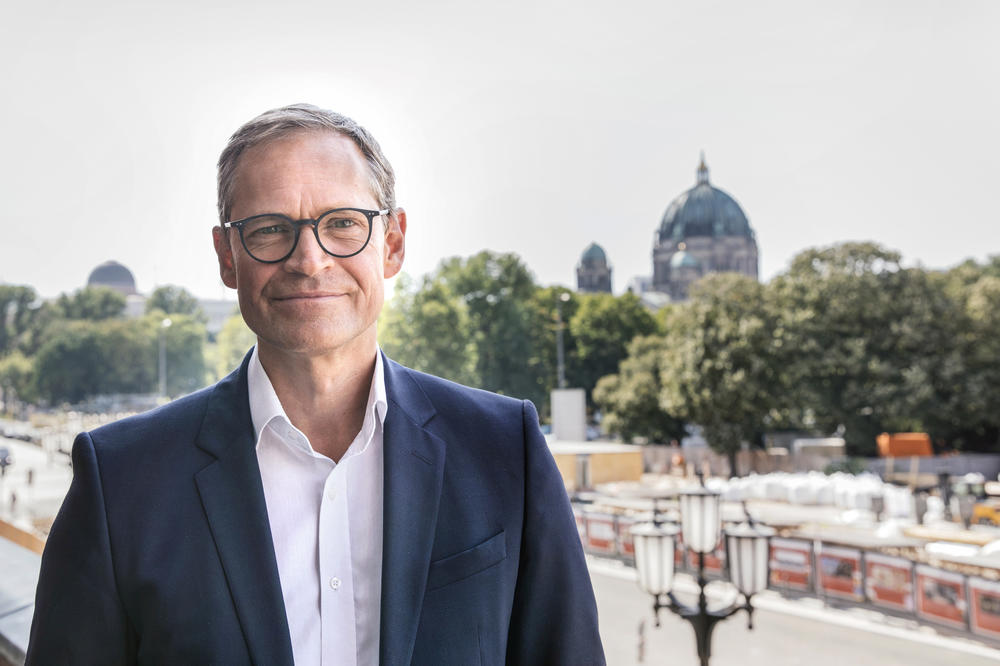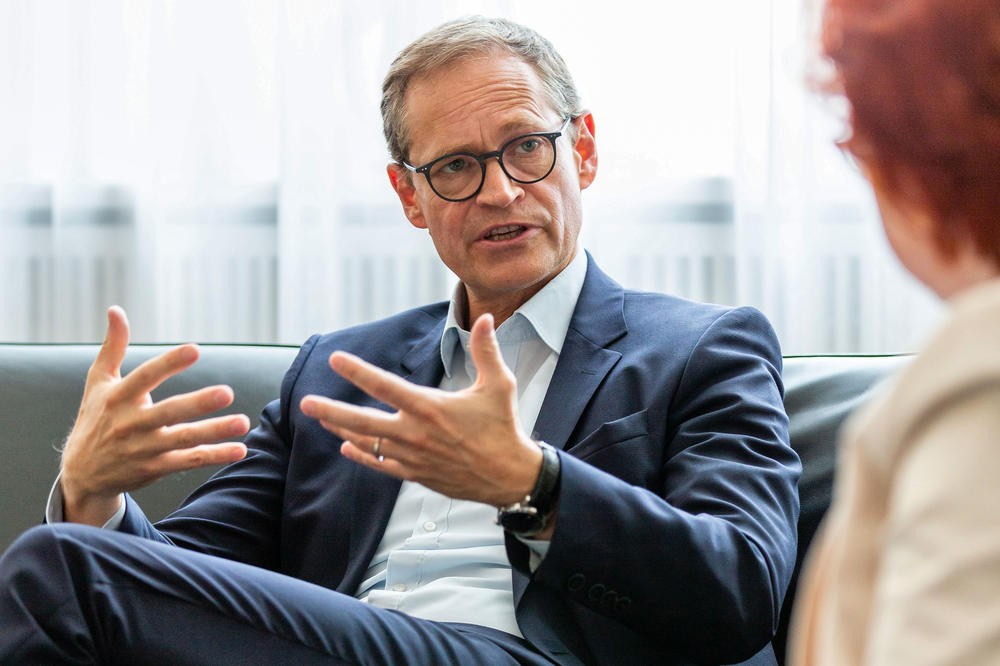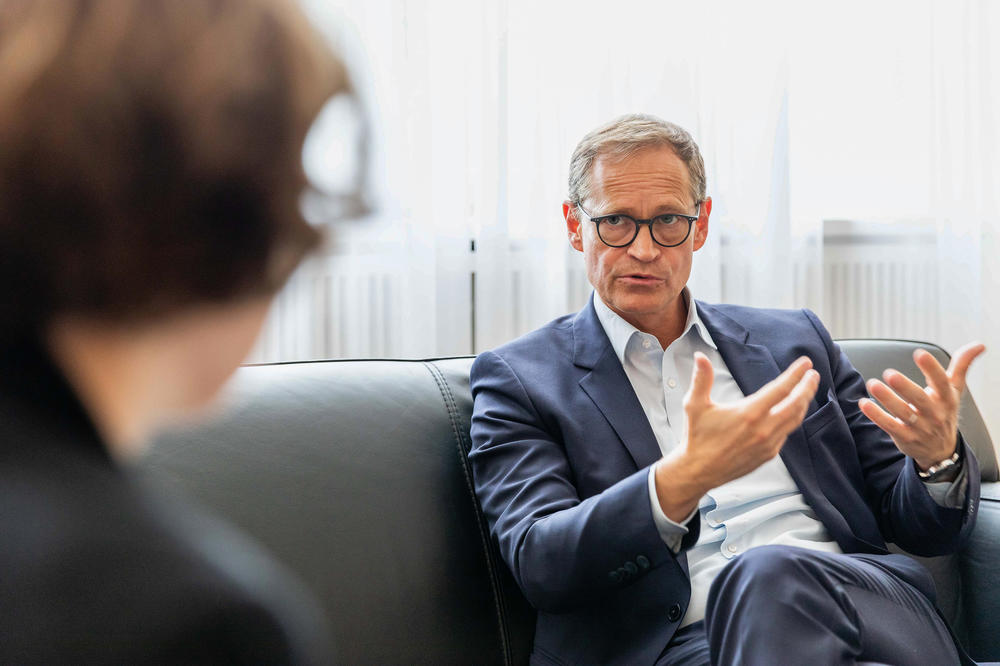“We need academic freedom to find answers to the great challenges of the future.”
In an interview Berlin’s Governing Mayor and Senator for Higher Education and Research, Michael Müller, talks about the potential benefits of a strong alliance among Berlin’s universities
Jul 16, 2019
Berlin’s Governing Mayor, Michael Müller, is also the city’s Senator for Higher Education and Research. From the very start of his term in office, he has been a proponent of Berlin’s universities and demonstrated his support for the consortium proposal submitted by Freie Universität Berlin, Humboldt-Universität zu Berlin, Technische Universität Berlin and Charité – Universitätsmedizin Berlin in the German government’s Excellence Strategy. Michael Müller spoke with us in an interview about Berlin’s development as a leading location for science and research, as well as ways for researchers, politicians, and the public to improve how they engage with one another.
Mr. Müller, in 2016 the three major Berlin universities and Charité decided to join forces to participate in the German government’s Excellence Strategy funding competition. How did you think the process has gone?
Michael Müller: It wasn’t easy at first. Many people had reservations that we had to move past. These concerns came from both policy makers as well as from the participating institutions themselves. But looking back at what we have achieved already, it is clear to me that it was a good decision to build stronger partnerships and apply together for Excellence Strategy funding. The various partners soon realized that the alliance would allow them to keep their own areas of expertise and unique profiles, while at the same time their close cooperation would enhance their national and international visibility.
What are some of the main arguments in favor of the alliance?
Michael Müller: Berlin has become a widely recognized and respected global location for academic research. Still, we are well aware of the fact that we face hard international competition. We have a lot to do! We want the brightest minds from around the world to come to Berlin, we want to better support young researchers, and we want to explore new fields of research. We also want to – we need to – find the answers to the pressing questions of the future with the help of science and research. The alliance, which brings together the three major Berlin universities and the Charité in close cooperation, provides a perfect foundation. We saw how beneficial that can be with our digitalization strategy. A good example is the Einstein Center Digital Future, which includes participants from each of the Berlin University Alliance members as well as from the Berlin University of the Arts and various universities of applied science. The “Gesundheitsstadt 2030” initiative to make Berlin a health capital by 2030 takes the same approach. Structural partnerships between cutting-edge medical research and the health-care sector produce significant benefits for patients. Here we have two examples that show Berlin thrives when people work together.
"Research must be free and independent. That freedom, in turn, powers dynamic change."
Image Credit: Felix Noak
Where do you see Berlin as a research hub in ten years if the decision on July 19 is positive and the Berlin University Alliance is successful with its proposal in the Excellence Strategy?
Michael Müller: By then I want to see Berlin become one of the best research hotspots worldwide. Given the outstanding institutions of higher education and research situated here, the capital of Germany should strive, and this is particularly important to me, to join the ranks of other global leaders across an entire range of subjects in research, education, and knowledge exchange. We don’t want to just be strong in research fields focused on technology; we also need strong humanities and social sciences in order to address serious social issues. In ten years, we want Berlin to be on the cutting-edge of research development – with regard to developing ideas about how we live together, about how to deal with climate change, and about other problems that we are currently facing.
What will the Berlin Senate do if the Alliance does not get the Excellence Strategy funding? What do you expect the partner institutions to do in that case?
Michael Müller: Of course, a negative outcome would be a huge disappointment, especially when you consider how many people have invested time and energy into our shared vision over the last few years. A lot of Herzblut (“heart and soul”) has gone into the Berlin University Alliance project. Bad news would also mean that we need to take some time for critical self-reflection and evaluate where we might have deficiencies and where we can improve. Then we need to work on those areas. But even if that is what happens, we – politicians and administration – plan on continuing our support for cooperation and strengthening the Alliance. I am deeply convinced that this collaborative approach is the next logical step for Berlin as a research hub. We have already planned an additional 6 million euros annually in our state budget for the new program of the Einstein Foundation for attracting outstanding researchers and research projects within the Berlin University Alliance. That is just one example of how we will continue to support the Alliance even if the proposal is not successful.
When Berliners ask you why science and scholarship are important, what do you tell them?
Michael Müller: Actually, I don’t hear that question often enough, which is a shame. Academic research is such an important and successful part of our city, but most people are not aware of that, and the media do not cover the topic extensively. It would be great to hear the question more because practically everything going on in our world today is connected to science and research, whether it is innovative ideas on mobility, on how we work together in the digital world, new forms of housing, or participation processes. The research conducted at our universities plays a role, at least indirectly, in the lives of all Berliners. Which is why we should be proud of Berlin’s research environment – and why we should support it and invest in it.
How can universities and politicians promote research communication and knowledge exchange?
Michael Müller: We must continue to talk about it and raise interest. We still need more openness, more transparency, and more creativity when it comes to research communication and knowledge exchange. We already have some exciting and successful event formats like the Long Night of Science, which has taken place annually for the last 19 years, and the relatively new Berlin Science Week. The research community should make more of an effort to reach out beyond the walls of the university. There are many possibilities to connect with the people in the city – be it in schools, parks, or night clubs – and get them involved with research projects and make research more tangible. More researchers are exploring innovative paths. Let us not forget, every five years new representatives are elected to our Parliament, and they all need to be informed, persuaded, and excited about science and research.
Politicians have to provide reliable structures that allow for long-term planning so that research can develop independently."
Image Credit: Felix Noak
How do you think universities and other members of the scientific community can better engage with the world of politics?
Michael Müller: Politicians want to be involved in processes that produce results during their term in office. However, the time frame for research is very different. We need to find new ways to connect the two sides. The people of Berlin expect that researchers and politicians can work together in a reasonable period to bring about change that improves their lives. We have to show them that it can be done. Politicians have to provide reliable structures that allow for long-term planning so that research can develop independently and researchers have all they need to achieve success. Researchers need to make their work and and findings more visible, and together we need to more often use their findings as the basis for political decision making.
Berlin’s academic scene appears to be going through a very dynamic phase. Where do you think this dynamism comes from?
Michael Müller: Money certainly has something to do with it. Berlin was in a difficult financial situation for many years. The city had to make cuts and take measures to save money. Since I took office, I have talked repeatedly about a decade of investment, which also includes investing in higher education. As Senator for Higher Education and Research, it is important to me that our institutions of higher education have the resources they need as well as financial support for construction and renovation projects. There is still a lot of catching up to do. From my perspective, more and more people are realizing that we can only find the answers to the questions of the future if research serves as a guide. In order to do so, research must be free and independent. That freedom, in turn, powers dynamic change. Berlin as a place where research is free and open is a distinguishing feature of our city. It is one of our greatest strengths, and it attracts many people from around the world. At the same time, we are becoming increasingly aware that this freedom is not something to take for granted. In other countries, science and research are subject to growing interference. It is very important to me that we protect this freedom in our country – and in particular in Berlin, the once divided city. Currently, there are over 190,000 students and thousands of researchers from all over the world living in Berlin. They all help keep our city moving, help bring about new ideas, and help Berlin be avant-garde in many fields. Those are some of the contributing factors shaping the dynamic environment in Berlin today. The Berlin University Alliance is also an expression of that vitality. Let’s keep our fingers crossed for Friday!
Nina Diezemann and Stefanie Terp conducted the interview.



